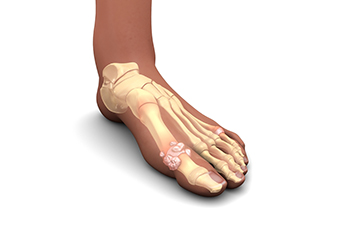
(908) 381-8160Berkeley Heights

Gout, a form of arthritis causing sudden, severe pain and swelling in the joints, has a notable genetic component. Research indicates that individuals with a family history of gout are at a higher risk of developing the condition themselves. This genetic predisposition often involves variations in genes that affect the body's ability to regulate uric acid levels. Elevated uric acid, which can form painful crystals in the joints, typically in the big toe, is a key factor in gout. Genetics may influence how the body processes purines, which are substances found in certain foods that can contribute to uric acid buildup. While genetics play a significant role, lifestyle and dietary choices also impact the likelihood of developing gout. Understanding this connection can help in managing and preventing the condition through both genetic awareness and proactive lifestyle adjustments. Gout can cause severe pain and discomfort. If you have had one or more gout attacks, it is strongly suggested that you are under the care of a podiatrist who can help you manage this condition.
Gout is a painful condition that can be treated. If you are seeking treatment, contact Dr. Janet Leicht from New Jersey. Our doctor will treat your foot and ankle needs.
What Is Gout?
Gout is a form of arthritis that is characterized by sudden, severe attacks of pain, redness, and tenderness in the joints. The condition usually affects the joint at the base of the big toe. A gout attack can occur at any random time, such as the middle of the night while you are asleep.
Symptoms
Risk Factors
Prior to visiting your podiatrist to receive treatment for gout, there are a few things you should do beforehand. If you have gout you should write down your symptoms--including when they started and how often you experience them, important medical information you may have, and any questions you may have. Writing down these three things will help your podiatrist in assessing your specific situation so that he or she may provide the best route of treatment for you.
If you have any questions, please feel free to contact our office located in Berkeley Heights, NJ . We offer the newest diagnostic and treatment technologies for all your foot care needs.